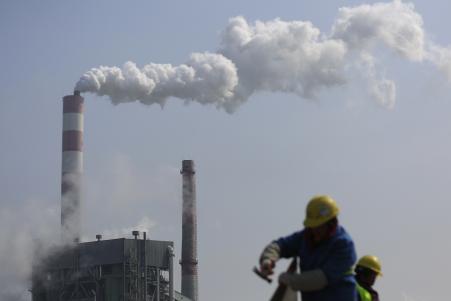By Maria Gallucci -

China’s attempts to curb its air pollution and lower its carbon footprint are starting to take hold. The country’s emissions of climate-warming carbon dioxide dropped last year for the first time in more than a decade, Bloomberg News reported Friday.
Total carbon emissions in the nation of 1.4 billion people dropped by 2 percent in 2014 compared with 2013 -- the first decline since 2001, according to a Bloomberg New Energy Finance (BNEF) review of preliminary energy demand data from China’s National Bureau of Statistics.
The falling emissions reflect China’s slowing demand for coal-fired electricity. The nation’s energy demand instead is shifting toward more natural gas, renewable energy and oil, Sophie Lu, a BNEF analyst in Beijing, told the media outlet.
The International Energy Agency said China’s shifting energy consumption is one of the reasons that global carbon emissions didn’t rise in 2014 -- the first time in 40 years that emissions have stayed flat without an economic crisis. The Paris-based watchdog group said Friday that global carbon emissions stood at 32.3 billion metric tons in 2014, unchanged from 2013.
"This is both a very welcome surprise and a significant one," Fatih Birol, the IEA's chief economist, said in a statement. "For the first time, greenhouse gas emissions are decoupling from economic growth.
Birol said the news provides "much-needed momentum" to the global effort to slash greenhouse gas emissions. Negotiators from nearly 200 countries are meeting throughout the year to forge a global emissions treaty, which leaders have agreed to sign at a United Nations-led conference in Paris this December.
China is the world's biggest climate-change polluter, followed by the United States. Chinese President Xi Jinping has pledged to cap the country's carbon output, with emissions peaking then declining after 2030. He's also promised to boost China's share of non-fossil fuels to 20 percent of the total energy mix over that same time frame.
The emissions cap marks a major shift in China’s climate policy, which for years has emphasized building more renewable energy projects and investing in energy efficiency while steering clear of any policy that could limit industrial and economic growth. Xi unveiled the target in November alongside U.S. President Barack Obama in a joint announcement meant to encourage leaders from other countries to adopt similarly aggressive pledges.
China last year accounted for more than a fourth of global investments in clean energy projects, including wind and solar installations and energy-saving buildings. Chinese investment jumped by 32 percent, to $89.5 billion, in 2014 thanks to heavy government spending, according to BNEF analysis in January. The Xi administration aims to get 11.4 percent of China’s electricity from renewable supplies by the end of this year, a target China seems on track to meet.
At the same time, China’s coal consumption dropped 2.9 percent in 2014, compared to 2013, the first drop in at least a decade, Tian Miao, a Beijing-based analyst at North Square Blue Oak, told Bloomberg.
Despite last year’s gains, however, climate experts say China's efforts to clean its energy mix still aren't dramatic enough to slow the rate of global warming. Xi’s target to cap emissions in 2030 will still allow the country to increase its carbon count over the next 15 years, helping to exacerbate the effects of climate change and increasing air pollution in Chinese cities. Some analyses show that China’s emissions should peak by 2025, or earlier, to avoid global warming above 2 degrees Celsius (3.6 degrees Fahrenheit).
